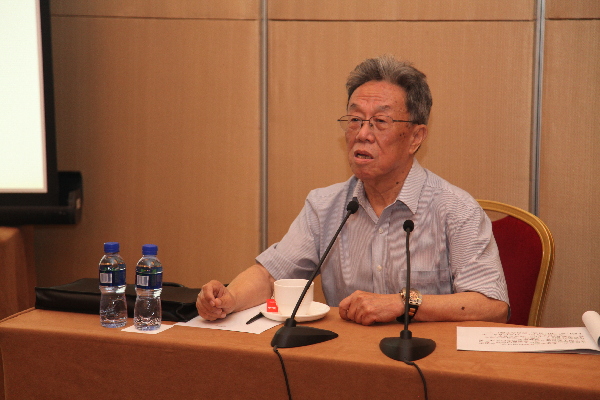RESOURCES
2015-07-09 Source:Chinaculture.org

Chinese writer, former Ministry of Culture, Wang Meng.
"The Chinese people have their very own logic that sometimes foreigners find hard to understand," said Chinese writer Wang Meng in a lecture at the 2015 Visiting Program for Young Sinologists held in Beijing Monday.
"The Chinese people do not pay much attention to Western logic, because they have their very own logic," he said, "and such logics are derived from the Chinese culture, where morality is emphasized more than facts."
Wang borrowed a saying from the Analects of Confucius to explain why leaders in China, especially politicians, cannot have moral defects, such as having an affair, a mistress or the like. "To run the country with morality wins a ruler the respect that the Pole Star gets, circled by numerous other stars," he quoted the saying.
He said it is also important for the people to live up to standards to the social moralities so long as such moralities are still valued by the society. "In most circumstances, morality is more than that of ability, because they believe this is the prerequisite to do a job well," Wang explained.
Wang Meng also explained some of the controversial Chinese phenomena from the perspective of Chinese classics. For example, Chinese's being impatient in public places, making loud noises, etc. He said the lack of public discipline goes all the way up to the ancient philosophy of emphasizing self-improvement that people pay too much attention on striving for a better future for themselves and their families, and ended up doing poorly in public places.
The sinologists attending the lecture were quite intrigued by his interpretations. They nodded and bursted into laugh every now and then while they seemed to have grasped the nuances of the Chinese culture.

Wang Meng giving a lecture on Chinese People and Chinese Culture at the 2015 Visiting Program for Young Sinologists on July 6.
In the Q&A round, the sinologists shared their own observations on the Chinese culture, and their questions brought about from their work.
Alexander Pevzner raised his doubts on the translation of the word "cynical". "Why in Chinese, there isn't an exact translation for the word ‘cynical'? Does it have anything to do with the Chinese politics and culture?" he asked.
Wang Meng cleared his doubts by giving examples from history. "The Chinese have actually gone from one extreme to another extreme in the last century," he said.
According to Wang, China used to be quite arrogant and presumptuous before the collapse of the Qing Dyansty (221-206 BC), and after that the Chinese tended to negate whatever there was in the Chinese culture, and turned to science and democracy for self-salvation. The Chinese after that learned to put away their arrogance and really learn from the West, and that's possibly why we translated cynical into highly critical, rather than despising others.
Hungarian sinologist Sandor Dr, P Szabo asked Wang Meng his opinion on the relationship of the Chinese culture and the western culture in times of globalization. For which, Wang Meng gave a vivid illustration.
"Globalization is parallel to that of diversification, the more to dive into another's culture, the more you know the importance of maintaining your own unique culture. So, globalization does not call for unification, but diversification. And that's why China is now earnestly applying for world heritages to protect those unique cultures," Wang said.
As to the cultural conflicts, Wang said, not all of them are inevitable, and some of the barriers will eventually melt down as time go by.
"In 1986, when I was the Ministry of Culture, some high women officials in the Communist Party prevented Shenzhen city from hosting a beauty contest, because they thought it was an insult to women. But now, Sanya in Hainan province has become a central stage for beauty contest, so things are constantly changing," Wang said.